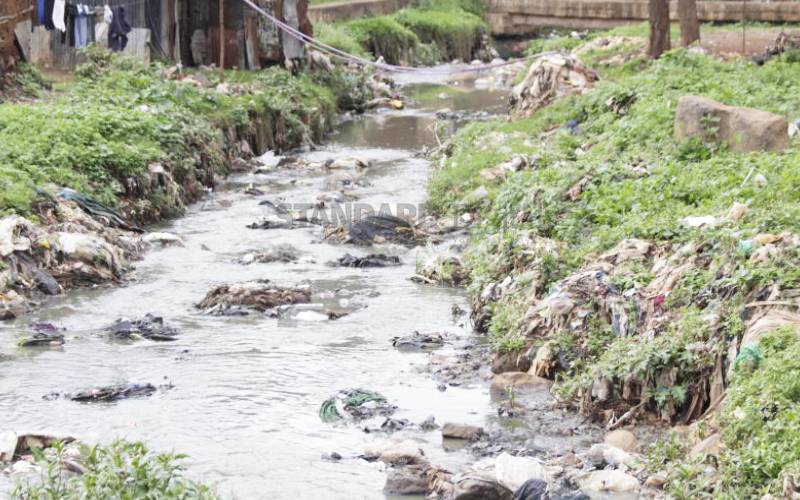
Cholera risk in the area, however, remains because of the county’s open defecation rate is 18.8 per cent.
At the end of a small garden in Mark Kisang’s homestead in Elgeyo Marakwet stands a mound of sandy soil. It is the only reminder that his son Kiprono, who died of cholera aged five, ever existed.
“In another year or two,” Kisang explains, “this mound will no longer be here and we will continue planting beans and other crops.”
It could have been worse. His wife, Rebecca, who was nursing Kiprono also contracted cholera.
“I made it to hospital for treatment,” Rebecca says. “But my child died just like that.”
Her child was among the first victims in Elgeyo Marakwet County to succumb to the disease. Barely a stone's throw away, another family lost their matriarch who was 60.
“She started having diarrhoea out of the blue,” her son Willy Chesir recalls. "But as we rushed her downhill to the hospital, she died. This disease just happens, and the diarrhoea has no brakes.”
These two, though generations apart, were among 19 victims who died following a cholera outbreak that hit Sagat, Kipaiywa, Kachenyut, Kiboiten and Kapchesum villages in Marakwet East in 2018.
Kaptora assistant chief Joseph Cheboi says it was a challenge establishing the root cause of the outbreak.
“We eventually found out that the source of the outbreak was from River Embomon,” Cheboi said. “People defecate at the Embomon stream and the one at Kaptora. Both had to be chlorinated at 10-meter intervals to contain the outbreak.”
In Kenya, diarrhoeal diseases are the fourth commonest illnesses and cause of death after HIV and Malaria. Public health experts attribute this to open defaecation, case in point being Elgeyo Marakwet County where three out of every 10 households lack latrines or toilets.
“When you tell people to dig latrines, they wonder what you are talking about because many do not even have food,” Cheboi says, adding that with insecurity and poor roads and limiting access to health facilities, digging latrines is the last thing on residents’ minds.
After quarantine restricting movements between villages, closing business premises selling food and public health talks, the cholera outbreak in Elgeyo Marakwet was contained within 21 days. Since then, 640 out of 750 households in Sagat have dug latrines.
Cholera risk in the area, however, remains because of the county’s open defecation rate is 18.8 per cent.
These water and sanitation challenges are not unique to Elgeyo Marakwet County.
Lake Victoria, Homa Bay’s main water source, is a cesspit because of open-air defaecation. Of its 3,101 villages, only three out of four households have latrines with the rest defaecating in bushes or the shores of the lake.
“We just relieve ourselves anywhere as long as it is hidden. Children just defaecate in the homestead and then we pick the waste and throw it away,” says Charles Ocharo.
This has serious ecological and health implications as fishermen know only too well.
“We no longer harvest a good catch. And when you step in the water, it irritates the feet and we suspect it is because poorly treated sewerage is discharged into the lake,” Joseph Onyango, a fisherman, explains.
But Paul Agwanda, Homa Bay Water and Sanitation Hygiene (WASH) coordinator, disputes this, saying the sewerage system is intact and the final discharge to the lake is safe for human and fish.
Agwanda, however, explains that the nature of soil in the county also discourages residents from constructing pit latrines. “The type of soil is black cotton soil and when it rains latrines get damaged, and it becomes a continuous process of reconstructing latrines,” says Agwanda.
In Kericho, the lush, green highlands covered with expansive tea plantations belie the fact faecal matter was found in water samples collected from 80 per cent of households.
At the Kericho open-air market, burst sewers are the norm rather than the exception. The traders and customers alike do not have readily accessible toilets and clean safe drinking water. A nondescript dumping site within the market shares space with vegetables and food stuffs on sale.
“We don’t have water, you have to go to the hotels to ask for it,” Joel Rono says.
 The Standard Group Plc is a multi-media organization with investments in media
platforms spanning newspaper print
operations, television, radio broadcasting, digital and online services. The
Standard Group is recognized as a
leading multi-media house in Kenya with a key influence in matters of national
and international interest.
The Standard Group Plc is a multi-media organization with investments in media
platforms spanning newspaper print
operations, television, radio broadcasting, digital and online services. The
Standard Group is recognized as a
leading multi-media house in Kenya with a key influence in matters of national
and international interest.











